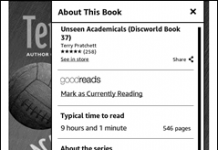
It all started harmlessly enough with Amazon’s Kindle with Special Offers. That’s the cheaper Kindle that displays ads when the device is in sleep mode or at the bottom of the screen when paging through the owner’s catalog of books. It is very unobtrusive and, since it lowered the price of the device, has made that Kindle an extremely popular device.
Now there are rumors that Amazon is selling ad space on the Kindle Fire’s welcome screen. That sounds pretty reasonable too as it’s a simple way for Amazon to drive a bit of additional income that’s pure profit for them.
Given that Amazon’s goal is to offer customers the lowest prices on everything, what’s the next logical step? How about even lower prices on ebooks where Amazon starts making money on in-book ads? Think Google AdWords, built right into the book. Of course Amazon won’t want to use Google’s platform. They’ll use their own so they keep 100% of the revenue.
The changes the DoJ is requiring for the agency model means a retailer can’t sell ebooks at a loss but they can still sell them for no profit, or breakeven. IOW, the 30% the retailer would keep on an agency ebook sale can be passed along to the customer as a 30% discount on the list price, but that’s as deep a discount as that retailer can offer.
The rules are different with the wholesale model. Amazon already loses money on sales of many wholesale model ebooks. Let’s talk about a hypothetical wholesale model title with a digital list price of $25. Amazon is required to pay the publisher roughly half that price, or about $12.50 for every copy sold, but that ebook might be one of the many that are listed at $9.99 for the Kindle. So every time Amazon sells a copy they lose $2.51 ($12.50 minus $9.99). Amazon has deep enough pockets to continue doing this though, so they’re quite comfortable losing money and building market share.
So what’s preventing Amazon from taking an even bigger loss and selling that ebook for $4.99 or 99-cents instead? In the wholesale model world, the answer to that question is “nothing is preventing them from doing that.” And if selling ebooks at a loss for $9.99 makes sense, especially when it comes to building market share, why doesn’t it also make sense to sell them at $4.99, 99-cents or even zero for some period of time? It probably depends on how much pain Amazon wants to inflict on other retailers and how much attention they’re willing to call to themselves for predatory pricing.
Make no mistake about the fact that Amazon would love to see ebook pricing approach zero. That’s right. Zero. That might seem outlandish but isn’t that exactly what they’re doing with their Kindle Owner’s Lending Library program? Now you can read ebooks for free as part of your Prime membership. The cost of Prime didn’t go up, so they’ve essentially made the consumer price of those ebooks zero.
Why wouldn’t they take the same approach with in-book advertising?
At some point in the not too distant future I believe we’ll see ebooks on Amazon at fire sale prices. I’m not just talking about self-published titles or books nobody wants. I’ll bet this happens with some bestsellers and midlist titles too. Amazon will make a big deal out of it and note how these cheaper prices are only available thru Amazon’s in-book advertising program. Maybe they’ll still offer the ad-free editions at the higher price, but you can bet they’ll make the ad-subsidized editions irresistable.
Remember that they can only do this for books in the wholesale model. But quite a few publishers use the wholesale model, so the list opportunities are enormous. And as Amazon builds momentum with this they’ll also build a very strong advertising platform. One that could conceivably compete with Google AdWords outside of ebooks too.
As long as Amazon still has to pay the full wholesale discount price publishers and authors won’t suffer. Other ebook retailers will though. Imgaine B&N trying to compete if a large portion of Amazon’s ebook list drops from $9.99 to $4.99 or less. Even with Microsoft’s cash injection B&N simply doesn’t have deep enough pockets to compete on losses like this, at least not for very long.
At the same time Amazon will likely tell publishers they only way they can compete is by significantly lowering their ebook list prices. They’ll have the data to show how sales went up dramatically when consumer prices dropped to $4.99 or less. I wouldn’t be surprised if Amazon would give preferential treatment to publishers who agree to lower their list prices (e.g., more promotions, better visibility, etc.)
By the time all that happens Amazon probably has more than 90% of the ebook market and a nice chunk of their ebook list that no longer has to be sold at a loss. And oh, let’s not forget about the wonderful in-book advertising platform they’ll have built buy then. That’s an advertising revenue stream that Amazon would not have to share with publishers or authors, btw, and that might be the most important point of all.
What do you think? Why wouldn’t Amazon follow this strategy, especially since it helps eliminate competitors, leads to market dominance and fixes the loss leader problem they currently have with many ebook sales?

































The possibility of in-book ads is the best argument I can think of to switch to Kobo or Nook or completely abandon ebooks all together. If I had the option to purchase a book for $12.99 or get a FREE copy with twelve ads inside, I’d pay, no doubt about it. Even if I were flat broke and unemployed, I wouldn’t go for in-book ad sponsorship.
As for drastic price reductions, I have my doubts. Suppose a 400 page novel has current agency price of $12.99 and you want to get it down to $4.99; that means you’d need to recover an $8.00 delta with ad revenue:
at $1 per ad, there would be one every 50 pages;
at $0.50 per ad, every 25 pages;
at $0.1 per ad, every 5 pages;
at $0.05 per ad, every 2.5 pages;
at $0.025 per ad, every 1.25 pages.
Now how much is an ad worth? As I understand it, ads pay per number of viewers; most books will sell less than 10,000 copies. If the in-book ad is for the next blockbuster movie, are the ads worth $1 or $0.025 each? My best guess is the ads with return revenue will be on the lower end of the scale, so that means a book flooded with ads like popular magazines.
But I program databases, so what do I know. Maybe somebody from the ad world could give better numbers.
Wowio.com used to have a model where they gave away ebooks that had one or two ads at the very beginning and/or very end of the ebook, with no ads anywhere else. While I’m not a big fan of ads, I suspect the average reader won’t flee Amazon for that. I think ads every couple of pages would prove unacceptable to most people.
What a piece of utter BS, Amazon hating, commercially ignorant, uninformed and plain dumb writing.
Couple of problems – It’s extremely likely Amazon would be sued by the Feds long before they controlled 90% of the ebook market. Second, It is extremely unlikely Apple would not react to such a scenario. Last I checked, Apple had over $100 BILLION in cash. Theoretically they could put Amazon out of the ebook business.
Third, if Amazon can sell adds on their device (or within books themselves) what would prevent Barnes and Noble from doing likewise?
I agree with the previous poster, this article is an obvious anti Amazon hit piece.
As someone intimately involved with creation and distribution of eBooks, as well as Amazon’s practices, I think this is a good article exploring some unpleasant, though realisitic, possibilities. I hope Joe doesn’t say “I told you so” in a year or two.
The Kindle can be the equivalent of a free parking space at a shopping mall. The incentive is first to facilitate visitation and then to facilitate the widest range of shopping opportunities. Amazon will act as the mall developer. Kindle will be a fulfillment device much like a card-swipe device.
I think what most people are forgetting is that when mass market books were at their height of popularity, they contained ads, most often several pages of ads at the end of the book, and even tear out, mail-in ad cards in the middle of the book. How many of us looked at the “x-ray glasses” ads at the back of comic books when we were kids? Technically, even the “praise” for an authors previous works on the back of hardcover books are ads.
If you think people are going to abandon ebooks because of ads, you are sadly mistaken. It’s already been seen that lower prices sell more ebooks. There are a few individuals that will not buy cheaper ebooks because of ads, but my bet is that more people will buy more books at even lower prices.
One scenario that Joe did not bring up though is the old “razor and blades” method of selling. It has also been rumored that Amazon may eventually give away a Kindle when you join Amazon Prime, hoping to make even more money by selling the ebooks (or ebooks infused with ads). Since they technically have control over the items on your Kindle (as was seen with Amazon’s quiet removal of a pirated copy of 1984 from many Kindles a few years ago), they could require that continued use of your “free” Kindle is tied to a “renewal” of your Amazon Prime subscription each year at $79. If that Kindle lasts you 3 years, that free Kindle just cost you $237, more than paying for the device and making up for losses taken in the wholesale model.
Ultimately, Amazon has an array of choices that continue to drive down the cost of both the device and the books.